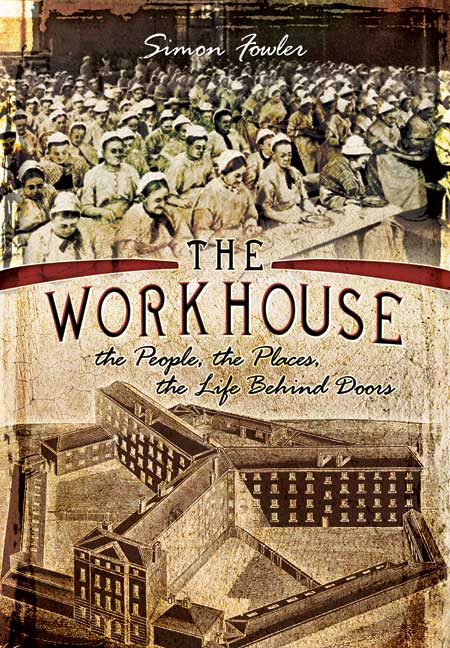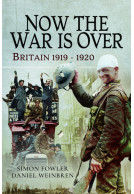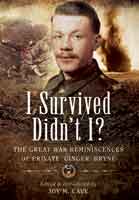The Workhouse (Paperback)
The People, The Places, The Life Behind Doors
Imprint: Pen & Sword History
Pages: 214
Illustrations: 15 black and white
ISBN: 9781783831517
Published: 11th September 2014
Last Released: 30th September 2024
(click here for international delivery rates)
Order within the next 39 minutes to get your order processed the next working day!
Need a currency converter? Check XE.com for live rates
| Other formats available | Price |
|---|---|
| The Workhouse ePub (12.2 MB) Add to Basket | £6.99 |
'The stories of those who lived in the shadow of the workhouse'
During the nineteenth century the workhouse cast a shadow over the lives of the poor. The destitute and the desperate sought refuge within its forbidding walls. And it was an ever-present threat if poor families failed to look after themselves properly. As a result a grim mythology has grown up about the horrors of the 'house' and the mistreatment meted out to the innocent pauper.
In this fully-updated and revised edition of his bestselling book, Simon Fowler takes a fresh look at the workhouse and the people who sought help from it. He looks at how the system of the Poor Law – of which the workhouse was a key part – was organised and the men and women who ran the workhouses or were employed to care for the inmates.
But above all this is the moving story of the tens of thousands of children, men, women and the elderly who were forced to endure grim conditions to survive in an unfeeling world.
'A poignant account ... draws powerfully on letters from The National Archives ... [Simon Fowler] brings out the horror, but it is fair-minded to those struggling to be humane within an inhumane system,' The Independent
'A good introduction,' The Guardian.
The history of workhouses and poverty ('misery history') has recently been prominently covered on TV shows like WDYTYA? and ITV's Secrets from the Workhouse, and referenced in historical dramas like The Village and Ripper Street.
After watching Call the Midwife, I was really curious as to what workhouses were really like. From everything I've ever heard they were horrible and those that were lucky to outlast them, always carried the trauma with them.
NetGalley, Christine Pogon
I found this book incredibly well-done. Fowler seemed to have done his research in spades. The picture painted was one of absolute suffering. Before reading this I thought I knew how awful the Victorian workhouses were--I came away with a whole new appreciation for what those stuck in them went through. Fowler did a great job of bringing the reader into what life was like.
Rating: 5 out of 5 stars
NetGalley, Claire Smith
A well researched and interesting look into the workhouse system.
I enjoyed the book and had no issue with the pace and style of writing.
I thoroughly enjoyed this - it was such a fascinating account of life in the 19th century workhouse. It provided a lot of interesting facts and serves as a solid introduction to the history and impact of these dreadful institutions.
NetGalley, Alison Black
Rating: 5 out of 5 stars
NetGalley, Sally Hinchliffe
I wanted to read this book because one branch of my family had members who were inmates in workhouses, whilst the other side of the family were involved in making sure they were run properly. I found the book interesting and would recommend it.
Simon Fowler's The Workhouse was a fascinating and useful account of life in the workhouse of the nineteenth century with many interesting facts. It is a great introduction to these dreadful institutions.
NetGalley, Rania Ioannou
Rating: 5 out of 5 stars
NetGalley, Wendy M Rhodes
For as long as I remember I have had a fascination about the workhouse. It seems incredible to think that you could be shut away for simply not having the means to provide for yourself and your family. Some heartbreaking stories. Recommended.
An insight into what Workhouses were like to live or work in, considering why theirs came to be in the and how they were managed. Quite often heartbreaking , but always an honest assessment Raises a lot of questions about welfare and how the poor are treated now as much as in the past. A very interesting book.
NetGalley, Tara Keating
Rating: 5 out of 5 stars
NetGalley, Alicia Wolf
This is one of my favorites I have gotten so far. The writing was excellent and the research was done well. I would love to read more from this author.
Great read for history fans and those that want to learn more about class and society in the past. Definitely recommend.
NetGalley, Charlie Read
Rating: 5 out of 5 stars
NetGalley, Shannon Wadlan
5 stars- ⭐⭐⭐⭐⭐- This book follows extensively and truly well detailed about workhouses in the 19th century and tells you about the poor who had to go here to seek refuge or even a job! Tells the story of many tens of thousands of men, women and children and even the elderly whom worked in these grim and poor and shocking conditions and their life within workhouse walls which is utterly shocking and so sad to read the conditions they had to live and survive in! While the people running these workhouses letting this happen and is okay with it.. which is very disgusting, Explains and shows how inhumane the workhouse system was!
Very interesting but very saddening read about what they had to live survive and work in such conditions!
An interesting book for anybody with an interest in Victorian history, in depth studies of the nemesis of the poor The Workhouse. The book tries to explain both sides of the arguments by using facts rather than opinions. A book you can dip into to research aspects of the period.
NetGalley, Gordon Jefrries
This is a fascinating look at the Workhouses and the author has done extensive research. Too many books focus on the negatives of Workhouses but this author has done a great job explaining the good points and not exaggerating or sensationalizing the negatives. He states the good intentions of why the Workhouses were created but just like today's time, there is so much corruption that greatly hinders these good intentions.
NetGalley, Kelly Long
The Workhouse by Simon Fowler is a well-researched, fascinating (though somewhat grim) account of life in Britain's workhouses.
NetGalley, Ana Marsh
Today the workhouses conjure up images of abuse and horror, and rightfully so, but they actually began as charitable institutions to look after the poor, elderly, disabled, and unmarried mothers. In effect, they functioned as an early type of social welfare, something that was not seen in many other Western countries until much later. Like many well intentioned ventures, the workhouses were not without their problems, and many of the same problems still occur today - like 'concerns' about people becoming too reliant on welfare to the point where they 'decide' not to work, or the overseers taking cuts of the money or produce to fund their own lifestyles.
Fowler explores all aspects of the workhouse, including (but not limited to) the working conditions, daily life, and the organisation of the workhouses. There are also images, and inclusions of memoirs and letters by people who lived and worked in workhouses.
The Workhouse was extremely easy to read (writing wise, not content wise), and is a valuable resource for those who are interested in history (and family history in particular.)
Rating: 5 out of 5 stars
NetGalley, Peter Coxall
A fascinating and well-researched book into the truly dreadful institutions known as Workhouses. I cannot imagine the desperation of many of the inmates to allow themselves to be subjected to incredible humiliation, abuse, and squalor, rather than starve on the streets.
I really enjoyed reading this book. I learn alot about what is was like living in a work house. This book was well researched and packed with information and descriptions of workhouse that were even local to me which amazed me. At the end there is a very useful guide on how to look up if your ancestors were ever in a work house.
NetGalley, Claire Lavin
I'd like to say that I enjoyed this book, that is far too cheerful a word. Equal parts heartbreaking and fascinating, it was a very worthwhile read, and I appreciated the way that the individual stories augmented the history.
NetGalley, Tammy Buchli
Rating: 5 out of 5 stars
NetGalley, Tina Cay
In the nineteenth century, if you were poor, had given birth to an illegitimate child, or were unable to take care of yourself, you could be placed in a workhouse or voluntarily go there. It was not a pleasant place to be. Corruption ran rampant among the wardens and people in charge of the inmates. They would siphon off funds and even food or clothing meant for the most destitute of the population and sell off the products so that they would be able to live a gluttonous life or in order to leave tidy sums to leave to their heirs when they passed on.
The inmates toiled for ten hours a day for a few crumbs and no creature comforts. They were abused, beaten, molested, and otherwise humiliated.
It is good to read about the horrors of these poor people's experiences so that these are remembered and never allowed to occur again.
Everything you wanted to know about Workhouses is IN this book. The author has done a phenomenal job researching everything. From the designs throughout the years, to the hiring practices, reform acts, clothing, "jobs", food rations and menus to the very people who lived there and more.
NetGalley, Christine Cazeneuve
It is a very comprehensive look at that time period and it is broken down in to a wonderful format of main chapters and subchapters within. At the end of the book there are some great pictures and illustrations.
All your questions will be answered after you read this book! Get it now!
This was an excellent introduction to the topic - I knew a little bit about it but didn't realise the nuances between various workhouses, and how they evolved over time. It also brings to life the different experiences of the people who would have lived there - the children and the able-bodied, who would have had a particularly difficult experience, but also the elderly and the sick who might actually get some comfort (not always!) and care. It also highlights the testimonials from former housemates through memoirs and letters - including young Charlie Chaplin who spent some time as a child in Lambeth Workhouse.
NetGalley, V Le Breton
It was well-written and easy to follow. Really enjoyed it.
Rating: 5 out of 5 stars
NetGalley, Alison Bevington
I eagerly look forward to any new Pen and Sword publications as I know how beneficial they have been to my family history research. I’ve found previous books and articles by Simon Fowler very useful.
Even as someone who has been compiling their family tree for a while now I seem to find something of use in every new publication .This subject is of particular interest to me . Several of my ancestors had, unfortunately , reason to be in the workhouse at points in their lives . I also have family members who were master and governesses in the workhouse. This book was so useful to get an insight into both sides of the system .
A very interesting and informative read which I’m sure will continue to be of use when I’m looking into the lives of my ancestors.
Rating: 5 out of 5 stars
NetGalley, Louise Gray
This is absolutely fascinating. Without descending into “poverty porn,” the author presents a compassionate and well researched insight into the reality of being poor over generations of different welfare models. This book differs from other histories in this area through its thorough examination of the workhouse system itself, considering why the model came to be in the first place and how it was managed - and challenged - over the years. A very interesting book.
A fascinating and very comprehensive insight into what Workhouses were like to live or work in and the circumstances in which you were admitted.
NetGalley, Helen Frost
Poignant, sad and heartbreaking in places but a very honest assessment and I feel I learned a great deal. Raises a lot of questions about welfare and how the poor were treated in the past and how much variation there was.
I was particularly interested in the insights into Southwell Workhouse as I grew up in a village just six miles from there and was aware of the building and it’s existence.
All key areas are covered with lots of examples and quotes and some very interesting pictures and contemporary sources.
Definitely a recommended read.
Rating: 5 out of 5 stars
NetGalley, Annie Buchanan
Written by Dr. Simon Fowler, it's a meticulously researched, layman accessible academic treatise on the realities surrounding the establishment and administration of poor/work houses as one practical arm of the Poor Law. The book is laid out in a logical manner, with historical realities and day-to-day life of the inhabitants of workhouses followed by individual topic chapters including the working poor, different class divisions of the poor, destitute children, the sick and infirm, and modern workhouse museums and exhibitions. A cross-referenced index makes specific information easy to find quickly. The appendices are packed with good information on how to winnow information from historical sources for family genealogy research, as well as modern day workhouse museums/exhibits to visit. The bibliography is substantial and will provide many hours of further reading.
Rating: 5 out of 5 stars
NetGalley, Brenda Carleton
In Victorian England, the desperately poor had the choice...seek charity or seek refuse as "indoor paupers" at the workhouse. The latter was the absolute last resort and were at times described as worse than prison due to treatment, forced mindless labour such as oakum picking, the bare minimum amount of (terrible) food and unsanitary conditions. The author describes bleak "life" in the workhouse from first arriving to being segregated into groups to being bathed and clothed (usually dreadful clothing) to sleeping on the floor in cold and poorly-ventilated rooms to choking down grease/onion "soup". Not only that but inmates were privy to beatings and sometimes starvation. Disease and vermin were common.
That the book describes the New Poor Law in detail and those who implemented laws and the workhouse employees, especially those chosen (preferably married couples) as masters and matrons who were poorly paid and sometimes cruel and harsh is fascinating. Of course some workhouses were better than others but the innocent paupers were punished for being poor. One instance of a father taking a suet pudding to his son and it being swiped from his hand by an employee at the last second is heartbreaking. Vegetable plots were common but unfortunately not used at the workhouses themselves! It is no wonder that the temptation to bribe and steal were so strong, though that met with punishment. Workhouses were built to reform and get people working but they had worse effects and most people (other than casuals) didn't ever leave, dying in them. The author describes the differences between "deserving" and undeserving poor and the levels of poverty within the walls. We also see how the children, old, infirm and mentally disabled were treated. The experiences of Charlie Chaplin, Jack London and Charles Dickens are referred to.
This is an intriguing book for any Nonfiction reader. Heartbreaking, of course. These were real people. Some reformers and advocates really did want to help...in the right way...but most viewed the poor as an illness or something to be avoided and they suffered as a consequence.
Author article on the workhouse employee as featured in
WDYTYA? Magazine, December 2016
When you think of a 19th century workhouse, it's inevitable that Charles Dickens' Oliver Twist will spring to mind...Certainly, they weren't holiday camps and inmates were expected to do something towards their keep, but as Richmond author Simon Fowler argues convincingly, workhouses don't deserve the bad press they've been stuck with. For many paupers and desperately-in-need people, they were a safety net, without which many would have certainly starved. When viewed in the context of a welfare state where dwindling resources have to be matched to growing needs, the workhouse should be seen as a social policy tool that was probably ahead of its time.
Surrey Life Magazine
Simon Fowler has written an excellent account of life in the workhouse. ... Well worth reading.
Paul Diggett
If you want to find out about daily life for your ancestors in the workhouse, this authoritative book provides some excellent background information. There is also a useful section on Poor Law and workhouse records, plus an extensive bibliography if you want to delve deeper into the subject.
Who Do You Think You Are? Magazine
As seen in Essence Magazine.
Essence Magazine
About Simon Fowler
Simon Fowler is a professional researcher specialising in the records of the two world wars and central government. Over the years he has researched hundreds of men who served during the First World War and this book is very much based on his experiences in doing so. He was written a number of other guides for Pen & Sword including Tracing Your Army Ancestors, Tracing Your Navy Ancestors and Now the War is Over: Britain 1919-1920.





















